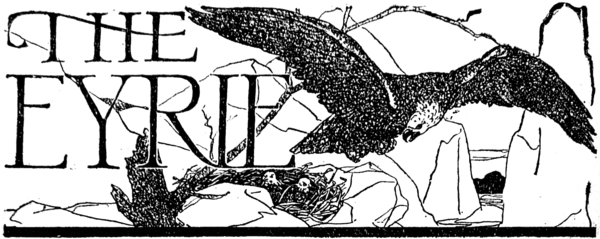
There have been a number of letters from you, the readers, inquiring about John R. Speer, author of Symphony of the Damned and The Carnal God. John Rawson Speer is a new writer. He was formerly an actor, but when the Depression settled down over the country, the ancient and honorable profession of actor was hit a body blow. Mr. Speer then enlisted in the United States Navy, where he has just completed his first enlistment. Another new writer is Thomas P. Kelley, author of our current serial story, The Last Pharaoh. As Tommy Kelley—"Pride of Miami Beach"—he engaged in some eighty-seven prize fights during the seasons of 1927-1928-1929.
Death of H. P. Lovecraft
Kenneth Sterling, of Cambridge, Massachusetts, writes: "I am sure you must be deeply grieved at the passing of Howard Phillips Lovecrafc. A contributor to Weird Tales since its inception, he has always been considered one of the leading writers of modern weird literature, and was, in my opinion, the pre-eminent creative artist in his field. His vivid, powerful style, unsurpassed in producing and sustaining a mood of horror, is well known to you and your readers. His decease leaves a gap which can never be filled. But it is a far more severe loss to those of us who had the infinite pleasure of a personal acquaintance with the inimitable 'Ech-Pi-El.' His generosity and magnanimity won the love the respect of all who knew him. He possessed a supreme intellect—one which I have never seen exceeded—and I have come in contact with many prominent professors at Harvard Uruvessity. He had an incredible store of knowledge—he was versed in virtually every field of learning. In addition to this great erudition, he had an acutely analytical mind—his thinking was keenly logical and free of all bias and closed-minded narrowness. Contrary to what one would be led to expect from his fiction, Lovecraft was a confirmed materialist and iconoclast, as expressed in innumerable letters and articles. His conversation was transcendently brilliant, outshining even his excellent writings. He was a man of great vigor and sincerity, and had great influence on his circle of friends, many of whom are noted authors in the fantasy field and other types of fiction. I think it would be most fitting if H. P. Lovecraft were remembered as a scholar and thinker as well as an author. In closing, let me urge you to reprint many of Lovecraft's fine stories and poems, and if possible, to have his works published in permanent book form."
From Clark Ashton Smith
Clark Ashton Smith writes from Auburn, California: "I am profoundly saddened by the news of H. P. Lovecraft's death after a month of painful illness. The loss seems an intolerable one, and I am sure that it will be felt deeply and permanently by the whole weird fiction public. Most of all will it be felt by the myriad friends who knew Lovecraft through face-to-face meeting or correspondence: for in his case the highest literary genius was allied to the most brilliant and most endearing personal qualities. I—alas!—never met him, but we had corresponded for about seventeen years, and I felt that I knew him better than most people with whom I was thrown in daily intimacy. The first manuscript of his that I read (probably in 1920) confirmed me in the opinion of has genius from which I have never swerved at any time. It opened a new world of awesome speculation and eery sur-
122
